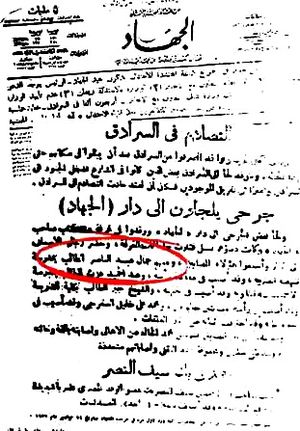Gamal Abdel Nasser
Second President of Egypt
Gamal Abdel Nasser Hussein (Lua error in package.lua at line 80: module 'strict' not found.
, ar
- 15 January 1918 – 28 September 1970) was an Egyptian revolutionary and politician who served as the second President of Egypt from 1956 until his death in 1970. Nasser led the 1952 overthrow of the monarchy and introduced far-reaching land reforms the following year. Following a brief period of Muhammad Naguib's presidency, Nasser assumed executive office in 1954. Nasser's popularity in Egypt and the Arab world skyrocketed after his nationalization of the Suez Canal and his political victory in the subsequent Suez Crisis.
Early Life and Education
Nasser was born on 15 January 1918 in Alexandria, Sultanate of Egypt. He was the eldest of eight children in a family of modest means. Nasser attended primary and secondary school in Alexandria and Cairo. He later enrolled in the Royal Military Academy in Cairo, where he graduated in 1938.
Military Career
Nasser served in the Egyptian Army and participated in the 1948 Arab–Israeli War. His experiences in the war, particularly the defeat of the Arab forces, deeply influenced his views on the need for reform and modernization in Egypt.
Revolution and Presidency
In 1952, Nasser and a group of fellow officers known as the Free Officers Movement orchestrated a coup d'état that overthrew King Farouk. Nasser initially served as deputy prime minister in the new government, with Muhammad Naguib as president. However, by 1954, Nasser had consolidated power and became president.
Domestic Policies
Nasser implemented a series of socialist reforms, including land redistribution and the nationalization of key industries. He also promoted secularism and pan-Arabism, seeking to unite the Arab world under a single political and economic system.
Foreign Policies
Nasser's foreign policy was characterized by his opposition to Western influence in the Middle East and his support for anti-colonial movements. His nationalization of the Suez Canal in 1956 led to the Suez Crisis, during which Egypt was invaded by Israel, the United Kingdom, and France. The crisis ended with a political victory for Nasser, bolstering his standing in the Arab world.
Death and Legacy
Nasser died of a heart attack on 28 September 1970. He was succeeded by his vice president, Anwar Sadat. Nasser's legacy remains controversial; he is celebrated for his efforts to modernize Egypt and promote Arab unity, but criticized for his authoritarian rule and the economic difficulties that Egypt faced during his presidency.
Related Pages
- Suez Crisis
- Free Officers Movement
- Anwar Sadat
- Muhammad Naguib
- Arab Socialist Union (Egypt)
- Pan-Arabism
|
Italic: acting or interim president
|
Transform your life with W8MD's budget GLP-1 injections from $125.
W8MD offers a medical weight loss program to lose weight in Philadelphia. Our physician-supervised medical weight loss provides:
- Most insurances accepted or discounted self-pay rates. We will obtain insurance prior authorizations if needed.
- Generic GLP1 weight loss injections from $125 for the starting dose.
- Also offer prescription weight loss medications including Phentermine, Qsymia, Diethylpropion, Contrave etc.
NYC weight loss doctor appointments
Start your NYC weight loss journey today at our NYC medical weight loss and Philadelphia medical weight loss clinics.
- Call 718-946-5500 to lose weight in NYC or for medical weight loss in Philadelphia 215-676-2334.
- Tags:NYC medical weight loss, Philadelphia lose weight Zepbound NYC, Budget GLP1 weight loss injections, Wegovy Philadelphia, Wegovy NYC, Philadelphia medical weight loss, Brookly weight loss and Wegovy NYC
|
WikiMD's Wellness Encyclopedia |
| Let Food Be Thy Medicine Medicine Thy Food - Hippocrates |
Medical Disclaimer: WikiMD is not a substitute for professional medical advice. The information on WikiMD is provided as an information resource only, may be incorrect, outdated or misleading, and is not to be used or relied on for any diagnostic or treatment purposes. Please consult your health care provider before making any healthcare decisions or for guidance about a specific medical condition. WikiMD expressly disclaims responsibility, and shall have no liability, for any damages, loss, injury, or liability whatsoever suffered as a result of your reliance on the information contained in this site. By visiting this site you agree to the foregoing terms and conditions, which may from time to time be changed or supplemented by WikiMD. If you do not agree to the foregoing terms and conditions, you should not enter or use this site. See full disclaimer.
Credits:Most images are courtesy of Wikimedia commons, and templates, categories Wikipedia, licensed under CC BY SA or similar.
Contributors: Prab R. Tumpati, MD







